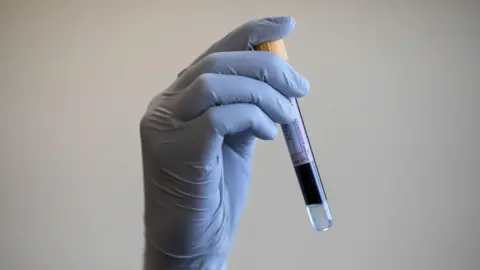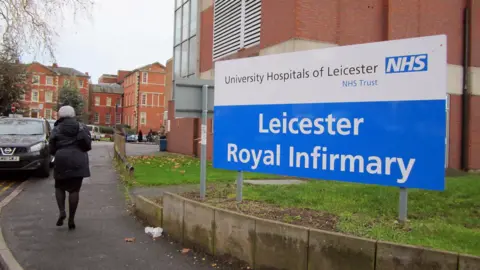Womb cancer blood test research 'could save lives'
 PA
PAResearchers say they hope to develop a blood test to improve diagnosis of a rare hard-to-detect cancer.
Uterine sarcomas make up just three out of 100 cancers of the womb, but the symptoms are similar to more common, and non-cancerous, fibroid growths.
In addition, womb cancers are commonly diagnosed by biopsies which only pick up one in three uterine sarcomas.
Two cancer charities have awarded funding to the University of Leicester to work with patients in Leicester's hospitals to increase understanding of these cancers, improve the diagnostic process for patients, and "save lives".
The Eve Appeal is funding work on a blood test to detect uterine sarcomas more accurately.
Earlier detection will help patients with decision-making, it said.
In addition, money from Sarcoma UK will look at the journey patients take and other factors which contribute to late diagnosis by looking at GP and hospital data from previously diagnosed patients.
 PA
PAAssociate professor of Gynaecological Oncology Dr Esther Moss said the "pilot" test - which looks to identify small fragments of tumour DNA in the bloodstream - would offer "a clearer diagnosis" meaning "informed" treatment and "hopefully improve outcomes".
Associate professor of Health Equity Dr Natalie Darko said: "It will also help reduce the health inequities that women of Black ethnicity currently face in the diagnosis and treatment of womb cancer, since women of Black ethnicity in particular have a higher risk of both fibroids and uterine sarcomas."
Athena Lamnisos, chief executive officer of The Eve Appeal, said the research "has the potential to transform diagnosis and care", while Sarcoma UK's director of research, policy and support, Dr Sorrel Bickley, said: "We are proud to fund this vital research.
"Every advancement in early detection could save lives."
'Symptoms misdiagnosed'
Mother-of-two Hayley Brewer was one patient whose cancer was mistaken for fibroids.
Struggling with heavy periods and bloating, which meant she was having to take two changes of clothes with her to her job as a teacher, the 39-year-old went to her GP.
She was told her condition was "normal" and she was approaching the menopause.
But Mrs Brewer returned a few months later with severe cramps, and a different GP referred her to hospital with an extremely swollen abdomen.
"I had an ultrasound and was told they 100% thought it was fibroids," said Mrs Brewer, of Ramsbottom, Greater Manchester. "I felt a huge amount of relief."
But a later MRI scan in the gynaecology department decided it could be uterine sarcoma, and the cancer diagnosis she had dreaded was later confirmed.

Mrs Brewer had a complete hysterectomy in January last year to remove the cancer and is undergoing regular checks to ensure it hasn't spread elsewhere.
Mrs Brewer said: "It was such a scary diagnosis to receive, and there wasn't much information out there about it.
"The hysterectomy means I'm in full-blown menopause, but my cancer is gone, and hopefully it will stay that way.
"I'm so glad that I got my diagnosis when I did. I often wonder what would have happened if I hadn't had the MRI scan.
"Anything that can be done to help get an earlier diagnosis, raise awareness of this type of cancer and potentially save lives has to be welcomed."
Dr Bickley, from Sarcoma UK, which helped Mrs Brewer to find a support group following her diagnosis, said: "Hayley's story of being initially misdiagnosed with fibroids, unfortunately, reflects the experience of many uterine sarcoma patients.
"When women like Hayley have to wait months before receiving an accurate diagnosis, it can have devastating consequences.
"By investigating referral pathways and diagnostic barriers, this research has the potential to transform how quickly patients receive the correct diagnosis and begin appropriate treatment."

Analysis
By Rob Sissons, BBC East Midlands health correspondent
Early diagnosis when it comes to cancer we're told all the time is key to improving outcomes and saving lives. We are all told to get symptoms checked out quickly and not dither and delay.
This latest research is an example of how modern medicine may be able to help push forward the frontiers of early diagnosis.
The beauty of a blood test is it is quick and relatively inexpensive.
The University of Leicester is rightly proud of attracting money for this research, as there is a lot of competition for funding.
People who have suffered this rare form of cancer will no doubt be glad to see it getting more attention.
This investment is a reminder that cancer is not one disease but many, and there are so many areas where diagnosis can be improved and treatments increasingly tailor-made.

Follow BBC Leicester on Facebook, on X, or on Instagram. Send your story ideas to [email protected] or via WhatsApp on 0808 100 2210.
